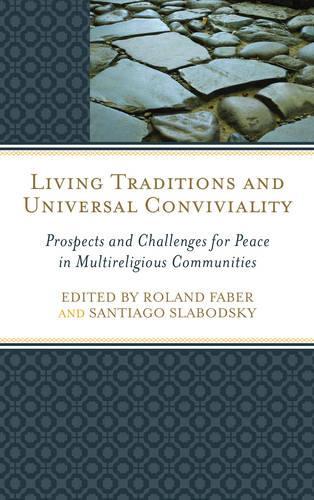
Living Traditions and Universal Conviviality: Prospects and Challenges for Peace in Multireligious Communities
(Hardback)
Publishing Details
Living Traditions and Universal Conviviality: Prospects and Challenges for Peace in Multireligious Communities
By (Author) Roland Faber
Edited by Santiago Slabodsky
Contributions by Rabbi Bradley Shavit Artson
Contributions by Dan Dombrowski
Contributions by Brianne Donaldson
Contributions by Jacob Erickson
Contributions by Roland Faber
Contributions by Meijun Fan
Contributions by Catherine Keller
Contributions by Ian Kluge
Bloomsbury Publishing PLC
Lexington Books
3rd March 2016
United States
Classifications
Professional and Scholarly
Non Fiction
201.72
Physical Properties
Hardback
284
Width 162mm, Height 239mm, Spine 25mm
608g
Description
The World Parliament of Religions adopted the view that there will not be peace in this world without including peace among religions. Yet, even with the unified force of the worlds religions and wisdom traditions, this cannot be accomplished without justice among people. In one way or another, unity among religions, as based on justice and the will to accept the others religions and even irreligiosity as means of justice, will not prevail without an internal and external, spiritual, theological, philosophical and practical investigation into the very reasons for religious strife and fanaticism as well as the resources that people, cultures, religions and wisdom traditions might provide to disentangle them from the injustices of their host regimes, and to seek the balance that leads to a measure of universal fairness among the multiplicity of religious and non-religious expressions of humanity. Conviviality expresses the depth and breadth of living together, which itself can be understood as a translation of a central term of Whitehead's philosophy and the process traditionconcrescence (growing together, becoming concrete)as it is recently and increasingly used in different discourses to name the concrete community of difference of individuals, cultures, and religions in appreciation of the mutual inclusiveness of their lives. This book seeks to bring together experts from different religious (and non-religious) traditions and spiritual persuasions to suggest ways in which the living wisdom traditions might contribute to, and transform themselves into, a universal conviviality among the people, cultures and religions of this world for a common future. It wishes to test the resources that we can contribute to this concurrent and urgent matter, aware of Whitehead's call for a radical transformation of power and violence in thought and action as, perhaps, the ultimate theory of conflict resolution.
Reviews
This volume asks what Whiteheads process philosophy can offer to a planet in the midst of continual religious and political rupture. Each essay carefully grapples with the prospect of balancing justice and peace without resorting to stifling assimilation or alienating the other. The result is a compelling collection that imagines interreligiousharmony not as a nave utopia of sameness, but as a continual unfolding of eventsin which differencesboth complementary and destructiveare ingredients. -- J. R. Hustwit, Methodist University
Author Bio
Roland Faber is Kilsby Family/John B. Cobb, Jr. professor of process studies at Claremont School of Theology, professor of religion and philosophy at Claremont Graduate University, executive codirector of the Center for Process Studies, and founder and executive director of the Whitehead Research Project. Santiago Slabodsky is Florence and Robert Kaufman chair in Jewish studies and assistant professor of religion at Hofstra UniversityNew York.
